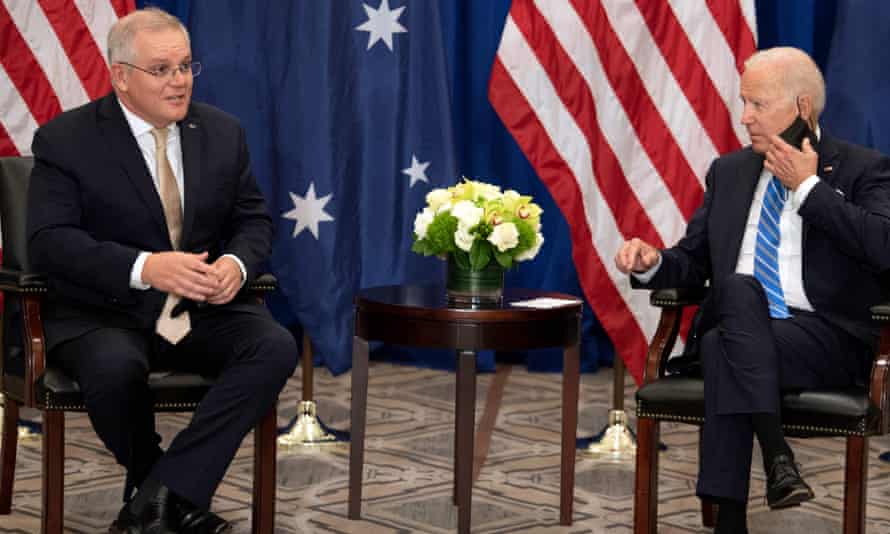US climate push on Australia and allies aims to ramp up pressure on China, ambassador says
Arthur Sinodinos declares Australia has the potential to be an ‘alternative energy superpower’ as Scott Morrison continues efforts to land new policy

Last modified on Mon 11 Oct 2021 22.51 EDT
The Biden administration has encouraged Scott Morrison and other allies to commit to stronger action on the climate crisis to ratchet up pressure on China to do its part, according to Arthur Sinodinos, Australia’s ambassador to the US.
As Morrison continues efforts to land a new climate policy ahead of the Cop26 summit in Glasgow, Sinodinos declared on Tuesday Australia had the potential to be “an alternative energy superpower” and he said investors were looking for certainty.
With the United Nations-led climate conference only weeks away, Morrison met on Monday afternoon with the Nationals leader, Barnaby Joyce, and ministers Bridget McKenzie, David Littleproud and Keith Pitt, as well as members of his leadership group, to step out policy options the government is considering.
Ministers were briefed for the first time about a roadmap that has been worked up by the energy and emissions reduction minister, Angus Taylor, with input from across the government. The roadmap includes assessments about when particular technologies would kick in to enable a transition to net zero emissions by mid-century.
The government’s climate plan will go to cabinet on Wednesday. On Monday afternoon, Taylor was asked by colleagues to supply more detail about the economic analysis underpinning the new proposed roadmap before the next cabinet-level meeting.
Nationals are particularly focused on the impact of the transition on jobs in the regions, and Monday’s presentation was felt to be lacking in detail.
The National party will hold a meeting this coming Sunday ahead of the resumption of federal parliament next week to consider whether or not a majority of MPs support Morrison’s objective to commit to net zero.
While Liberals are hopeful Morrison will emerge with an agreement with the Nationals by the beginning of next week, Nationals remain uncertain whether or not a majority of MPs in the party room actually support the prime minister’s climate policy pivot.
Joining a webinar organised by the not-for-profit organisation the Coalition for Conservation on Tuesday morning, Sinodinos – a former government minister and now the Australian ambassador to the US – said it would be “interesting to see” how the current policy discussions in Canberra played out.
Sinodinos said the Biden administration had increased the US emissions reduction target for 2030 “because they argue that to meet the goal of keeping the temperature rise to 1.5C we have to have intermediate targets like that on the way to a net zero target by 2050”.
He said the US had been “working with us and other countries on how we are more ambitious in dealing with climate change”.
Quick GuideHow to get the latest news from Guardian AustraliaShow

Email: sign up for our daily morning briefing newsletter
App: download the free app and never miss the biggest stories, or get our weekend edition for a curated selection of the week’s best stories
Social: follow us on YouTube, Facebook, Instagram, Twitter or TikTok
Podcast: listen to our daily episodes on Apple Podcasts, Spotify or search “Full Story” in your favourite app
“Now let me say in relation to China, the strategy of the US in terms of climate diplomacy has been to say to western countries, to allies and partners, let’s all essentially match ambition on climate change as a way of putting more pressure on China to bring forward its net zero commitment from 2060 and [its promise for] when emissions will peak,” Sinodinos said.
He said the important thing, from Australia’s perspective, would be working with countries in the Indo-Pacific region to spread “the benefits of new technologies, in a way that is more accessible and affordable to low and middle income countries”.
With Australia under pressure from key allies, and metropolitan Liberals preparing for challenges from climate-focused independents in heartland seats at a federal election over the coming months, Morrison has been signalling his support for a net zero target for many months.
There has also been persistent speculation the government may also increase Australia’s current 2030 emissions reduction target of a 26-28% cut on 2005 levels during the current deliberations. But with some Queensland Nationals implacably opposed to net zero, it is not clear whether Morrison can increase medium-term ambition.
Courtesy of a recent commitment by the New South Wales government, and with other states contributing to the heavy lifting on emissions reduction, Morrison would now be in a position to unveil a 34% cut in national greenhouse gas emissions by 2030 based on existing pledges, rather than sticking to the current national 2030 target of a 26 to 28% cut.
Liberals in metropolitan seats have urged Morrison to be ambitious. The Wentworth MP, Dave Sharma – one of several moderate Liberal MPs to address Tuesday’s webinar – said Australia needed to take “credible” targets to the Glasgow summit.
The NSW senator Andrew Bragg said he was “looking forward to Australia carrying its fair share” at Cop26. “I think we need to show that we’re on track – I think we need to have a revised 2030 target which gets us to around that sort of halfway mark,” Bragg said.
The North Sydney MP, Trent Zimmerman, said it was a “game-changer” that the US was playing a more proactive role on climate under Joe Biden.
Morrison has been on the fence for some weeks about whether or not to front the Glasgow conference. Colleagues now think the prime minister is more likely to go than not, but that is contingent on coming to terms with the Nationals about the policy.
